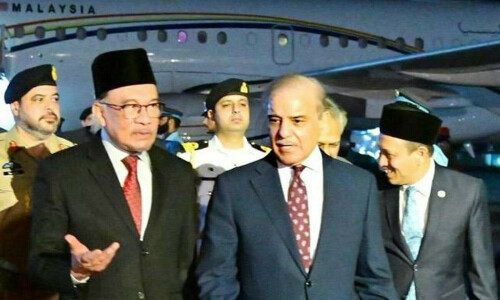ISLAMABAD: Having legally secured Rs145 billion Gas Infrastructure Development Cess (GIDC), the government has announced to expand the scope of withholding tax (WHT) on tax evaders, bring foreign remittances into the tax net and reduce customs tariff slabs and rates in the coming budget.
Briefing Senate Standing Committee on Finance and Revenue at a meeting presided over by Salim Mandviwala of PPP on Thursday, Secretary Finance Dr Waqar Masood Khan specifically thanked the senators for passing the GIDC as the government was in real trouble because of legal challenges but the parliamentary support would now help meet Rs145bn target set for this fiscal year.
Federal Board of Revenue (FBR) Chairman Tariq Bajwa told the panel that the lower oil prices had taken a heavy toll on revenue collection and the FBR faced a loss of Rs21bn even in last month.
Evaders will have to pay higher withholding tax
Responding to questions from senators on next year budget, he said the tax evaders or non-tax paying people would be subjected to higher withholding tax in the coming budget and the computerised national identity cards would stand converted into national tax numbers from July 1, 2015 by replacing NTNs.
He said it was also under consideration to put some restrictions on foreign remittances to regulate such transactions. He said under section 11 of the Income Tax Law, banks are required to provide a certificate of encashment of remittances, but tax officials were not authorised to ask questions, which was resulting into a channel of tax theft.
He said the FBR had consultations with the State Bank of Pakistan and a case was being taken to the federal cabinet to bring foreign remittances also under the tax net.
He said the customs tariff slabs were being reduced from existing six slabs to three and the rates would also be reduced. He said the FBR had collected valuable data regarding regular foreign visitors, buyers of luxury vehicles and more than Rs2 million of annual properties who would be issued notices for tax recovery if they were not paying proper taxes.
Finance Minister Ishaq Dar told the committee that the meeting of the National Economic Council will be held on June 1 to approve Public Sector Development Programme (PSDP) for next year and said the government would get the budget passed from the parliament by June 22 or 23.
In response to a question, Mr Dar said the government was required to transfer titles of 131 problematic properties in the name of PTCL to secure $800 million remaining privatisation proceeds from Etisalat and around 100 had so far been transferred. He said the government had asked Etisalat to deduct its 26 per cent share in the value of 31 remaining properties and transfer remaining amount to Pakistan.
However, the UAE-based firm was adamant on charging 100 per cent value of these 31 properties and wanted to keep around $300 million amount out of $800 million outstanding proceeds.
He said the government had told Etisalat that 74pc shares in the PTCL were still owned by Pakistan and this shareholding should be kept in view while setting aside the value of 31 properties. The matter was stuck up at this stage, he said.
Secretary Finance Dr Waqar Masood Khan said the government would continue the policy of stabilisation and austerity. He said all expenditures would be given nominal increases in the next budget except defence.
He said the requirements of the armed forces would be met at all cost and the financial pressure would continue next year on account of operation Zarb-i-Azb and resettlement of displaced persons.
He said the next year fiscal deficit limit would be set at 4.3 per cent of GDP including 0.3pc, or Rs100bn, for one-off extraordinary expenditures on settlement of displaced persons and security.
About 28 wings of civil law enforcement agencies would be created next year besides nine battalions of armed forces having combined expenditure of Rs40-45bn, he said. He said the pure military cost of the operation was estimated at about Rs20 billion.
Published in Dawn, May 22nd, 2015
On a mobile phone? Get the Dawn Mobile App: Apple Store | Google Play















































